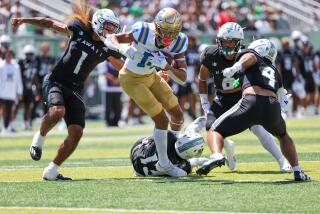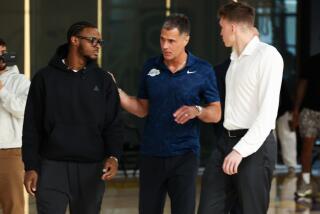HOME-COURT ADVANTAGE
- Share via
MIAMI — What accounts for the success of Miami Heat guard Dwyane Wade, a second-year player who arguably leads the league in highlight-reel moves? Teammates trumpet his unselfishness. Rival coaches rave about his pure talent. Heat Coach Stan Van Gundy marvels at his maturity. His high school coach points to his enthusiasm for the game. His sister Tragil cites his level-headed decision-making.
But Helen Bibbs, a 68-year-old widow from Robbins, Ill., believes she knows better about Wade, who is leading the Heat against the Washington Wizards in the Eastern Conference semifinals. In Miami’s 102-95 victory in Game 3 Thursday, Wade led the Heat with 31 points, nine rebounds and six assists.
Bibbs has watched -- well, listened to -- more of Wade’s progress than any college recruiter or NBA scout. Her bedroom is perched directly above the basketball hoop that is bolted to the stand-alone garage on the side of Wade’s father’s house.
For about 10 years, she said, she and her late husband would wake up not to their alarm clock, but to the beat of a basketball. They would attempt to fall asleep to the relentless thumping -- what with all those unforgivable late-night shooting sessions between Dwyane Sr. and Dwyane Jr. -- but that, unfortunately, was harder to do.
“It was all of the time, so people would complain -- and I was one of them,” Bibbs said with a laugh when reached at her home last week. “It would start early in the morning and it would go until late evening. Sometimes it would go away -- and you would assume they went to the community center. They had that basketball going all of the time.”
Ask Wade about his toughest critic. Ask him about his most challenging opponent. Ask him who has given him the most physical abuse on the court. The answer to all of those questions is Dwyane Wade Sr., a long-time rec league star who used to show up at his son’s high-school practices hoping for some minutes -- for himself -- and always vowed he would be able to dunk on his 50th birthday. He’s now 48.
“He taught me the game, what I needed to know to win games,” Wade said after a recent practice. “My toughness on the court came from him knocking me down and not picking me up. He was one of the biggest influences on me. He put the ball in my hands.
“He played all day and all night, and I wanted to, too.”
According to Bibbs, they darn near pulled it off.
Wade Sr. coached his son for years, officially and unofficially. The official coaching came during summer-league games at the Blue Island Recreation Center. The unofficial coaching came after. If during a game Wade Jr. made an egregious mistake -- such as putting up a shot with his right hand rather than more properly from the left -- there would likely be lessons to correct the problem on the home court.
The lessons would take place immediately, going on until Wade was exhausted, his father was satisfied and the neighbors were peeved beyond all description.
The result: Wade plays a fundamentally sound, well-rounded game with plenty of flair. Wade’s father also still plays a mean game, but, his son and daughter Tragil said, prefers not to give interviews. No matter. Bibby can vouch for the details.
Though Wade didn’t make his varsity team as a sophomore at Oak Lawn Richards High, he grew three inches that summer, emerged as a star his junior season and led the team as a senior to the Class AA Sectional Finals. He guided Marquette, one of only three schools to recruit him heavily because of academic issues, to the Final Four in 2003. Then, drafted fifth overall by Miami after leaving Marquette that spring, Wade pushed the Heat to the Eastern Conference semifinals as a rookie.
This season, with Shaquille O’Neal joining the Heat last summer, Wade increased his scoring average by nearly six points to 24.1 as he repeatedly showed spectacular, high-flying moves.
“His demeanor on the court,” Heat guard Damon Jones said, “is something that is breathtaking.”
Though just 23, Wade has an impressive resume. He was a unanimous All-Rookie first-team selection, third in Rookie of the Year balloting. He played on last year’s U.S. Olympic team at the Summer Games in Athens. In the Heat’s first-round playoff series sweep of the New Jersey Nets, Wade averaged 26 points, six rebounds and nearly nine assists.
So, what’s the most memorable victory of his career? It might have come in the eighth, maybe ninth grade. That’s when Wade Jr. first beat his father in one-on-one in the driveway.
“It didn’t go over well,” Wade said. “It was the toughest win I ever had. On the last point, he fouled me every time I shot.”
Wade Sr. also proved an enforcer in ensuring his son behaved himself off the court. Wade’s father was divorced from his mother not long after his son was born. Wade lived with his mother and three sisters on the southside of Chicago until he was 8, then moved in with his father and his second wife and her three sons. He remained there until his junior year of high school, when he moved in with his eventual mother-in-law. That was a bad time. Wade’s father and step-mother were having marital problems and Wade became frustrated by the fighting.
And he missed his first and only girlfriend Siohvaughn Funches, who went to college a year before he did. By staying with her mother, Wade could speak to Siohvaughn -- whom he married during his sophomore year of college -- more readily on the phone.
“He had to make decisions early,” said Tragil, five years older than her brother. “The way his dad is, it was ‘Hey, whatcha going to do? Are you going to do this here or that there? Whatcha going to do?’ At the end of the day, Dwyane Wade Jr. had to make decisions about his life.”
Careful to remove a wad of gum from his mouth before facing a circle of television cameras for a recent interview, Wade doesn’t sport a single tattoo, a rarity in the NBA. He doesn’t drink. “I always wanted to keep my parents happy, let them know they were raising a good child,” he said.
At Marquette, Wade decided he finally would get that tattoo his father forbade, envisioning a basketball hoop on his arm somewhere.
“I walked in [to a tattoo shop] and walked right back out,” he said. “It just didn’t feel like me.”
What does feel like him?
“I’m just expecting to be a player my team counts on,” he said. “It’s just the way I’ve always been. In the growing up process, you can go one way or the other. The way I decided to go is where I could get opportunities.”
More to Read
Go beyond the scoreboard
Get the latest on L.A.'s teams in the daily Sports Report newsletter.
You may occasionally receive promotional content from the Los Angeles Times.










